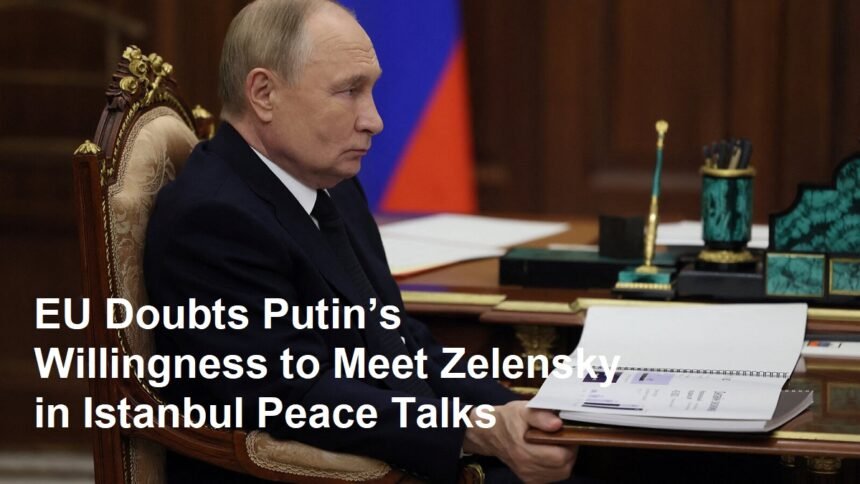The European Union (EU) has recently expressed a critical assessment regarding the upcoming peace negotiations scheduled to take place in Istanbul, Turkey, on May 15, 2025, between Russian President Vladimir Putin and Ukrainian President Volodymyr Zelensky. According to EU officials and diplomatic sources, there is a prevailing belief that President Putin may not have the willingness or courage to engage directly with President Zelensky in these high-stakes talks. This perspective sheds light on the complex dynamics surrounding the ongoing conflict between Russia and Ukraine and the challenges facing international efforts to broker peace.
The planned meeting in Istanbul has been widely anticipated as a potential breakthrough in the protracted and devastating conflict that has gripped Eastern Europe for years. The war has resulted in significant human suffering, displacement, and geopolitical instability, drawing intense international attention and prompting numerous diplomatic initiatives. The EU, as a key stakeholder in regional security and a supporter of Ukraine’s sovereignty, has been actively involved in facilitating dialogue and applying pressure for a peaceful resolution.
However, the EU’s assessment that Putin may shy away from a direct encounter with Zelensky reflects deep-seated concerns about Russia’s commitment to genuine negotiations. Several factors contribute to this skepticism. First, the longstanding mistrust between the two leaders and their respective governments complicates any prospect of face-to-face dialogue. Putin’s administration has often portrayed Zelensky’s government as illegitimate or influenced by Western powers, while Zelensky has accused Russia of aggression and violations of international law. This mutual distrust creates a formidable barrier to constructive engagement.
Second, the EU points to Russia’s strategic calculations and domestic political considerations. Putin’s leadership has been characterized by a strong emphasis on projecting strength and maintaining control over the narrative surrounding the conflict. Agreeing to meet Zelensky directly could be perceived domestically as a concession or sign of weakness, potentially undermining Putin’s political standing. Moreover, Russia’s broader geopolitical ambitions in the region may not align with the compromises necessary for a lasting peace agreement.
Third, the EU highlights the pattern of previous diplomatic efforts where Russia has shown reluctance or employed delaying tactics. Past negotiations have often been marked by missed opportunities, ambiguous commitments, and unilateral actions that have undermined trust. This history fuels doubts about the sincerity of Russia’s engagement in the Istanbul talks and raises questions about whether the meeting will result in substantive progress.
From the EU’s perspective, Putin’s potential absence or refusal to meet Zelensky directly could have significant implications. It risks undermining the credibility and effectiveness of the peace process, leaving Ukraine and the international community in a state of uncertainty. Without direct dialogue between the principal leaders, negotiations may be relegated to lower-level officials or intermediaries, which could limit the scope and impact of any agreements reached.
Furthermore, the EU is concerned about the message such a refusal would send to the global community. It could be interpreted as a lack of commitment to resolving the conflict peacefully and a disregard for diplomatic norms. This perception might embolden further aggressive actions or prolong the hostilities, exacerbating the humanitarian crisis and destabilizing the region further.
Despite these concerns, the EU remains committed to supporting Ukraine and facilitating dialogue wherever possible. The union continues to provide political, economic, and humanitarian assistance to Ukraine and works closely with international partners to maintain pressure on Russia to engage constructively. The EU also emphasizes the importance of upholding international law, respecting sovereignty, and protecting human rights as foundational principles guiding its approach.
Ukrainian President Zelensky, for his part, has expressed readiness to engage in talks and pursue peace, even under challenging circumstances. His willingness to meet in Istanbul signals a pragmatic approach aimed at ending the conflict and alleviating the suffering of the Ukrainian people. The EU supports this stance and encourages all parties to seize the opportunity for dialogue.
In conclusion, the European Union’s assessment that President Vladimir Putin may lack the courage or willingness to meet President Volodymyr Zelensky in the Istanbul peace negotiations underscores the profound difficulties facing the resolution of the Russia-Ukraine conflict. The EU’s concerns reflect a broader context of mistrust, strategic calculations, and political complexities that complicate diplomatic efforts. While the outcome of the May 15 talks remains uncertain, the EU’s position highlights the critical need for genuine engagement and leadership commitment to achieve a sustainable and just peace. The international community continues to watch closely, hopeful that despite the challenges, dialogue can pave the way toward ending one of the most pressing conflicts of our time.









